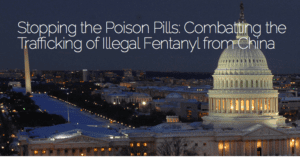Stopping The Poison Pills: Senate Caucus Hearing Held To Discuss Fentanyl
 The U.S. Senate Caucus on International Narcotics Control held a meeting on Tuesday, October 2, 2018 entitled “Stopping the Poison Pills: Combatting the Trafficking of Illegal Fentanyl from China.” Members of the caucus invited a total of six speakers to discuss with them what is currently being done to stem the tide of Chinese-made fentanyl into the United States and what more we could be doing to bring an end to this epidemic.
The U.S. Senate Caucus on International Narcotics Control held a meeting on Tuesday, October 2, 2018 entitled “Stopping the Poison Pills: Combatting the Trafficking of Illegal Fentanyl from China.” Members of the caucus invited a total of six speakers to discuss with them what is currently being done to stem the tide of Chinese-made fentanyl into the United States and what more we could be doing to bring an end to this epidemic.
As noted several times during the hearing, an estimated 72,000 Americans died from drug overdoses in 2017. 49,000 of those deaths involved an opioid with fentanyl playing a role in 60% percent of the cases. In his opening statement, Senator Chuck Grassley noted how fentanyl has changed the drug landscape: “A single individual with a computer, P.O. Box and a pill press can order fentanyl directly from China to his or her home. For the cost of a few thousand dollars of raw product, the sole proprietor can turn that raw fentanyl into thousands of pills worth literally millions of dollars on the street.”
China is the world’s largest producer of active pharmaceutical ingredients (API). There are an estimated 160,000 legal and illegal chemicals companies within the country. As noted by Paul E. Knierim, Deputy Chief of Operations at the Office of Global Enforcement at the U.S. Drug Enforcement Administration (DEA), it is from the legitimate chemical companies that API and precursor ingredients are diverted from. They are then sold to online buyers and transnational criminal organizations (TCOs).
In his written testimony, Daniel Burke, Senior Operations Manager of the Cybercrime Investigations Unit at the U.S. Food and Drug Administration’s Office of Criminal Investigations (FDA-OCI), listed cases in which FDA-OCI aided in bringing to justice the people selling fake fentanyl pills. One of the cases he referenced was the prosecution of Dr. Johnny C. Benjamin, Jr., who made the counterfeit oxycodone pill that killed Maggie Crowley. One challenge cited by Burke making it more difficult for the FDA-OCI to do their job was the implementation of European General Data Protection Regulation (GDPR), which while guaranteeing privacy for individuals, also lets websites hide information about themselves. More information about the impact that GDPR has had on the WHOIS record can be read here.
Knierim noted that most of the fentanyl was coming out of just one of China’s provinces – Guangdong and that the DEA is in the process of setting up an office in its capital city: Guangzhou. Once the office is established there, it will afford the DEA a better vantage point in which to challenge the illegal chemical manufacturers in that area.